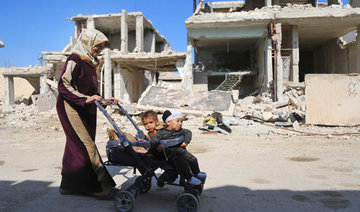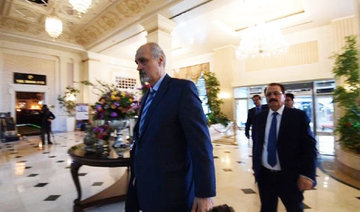MOSCOW: Russia’s decision two years ago to intervene militarily in Syria appears to have saved Bashar Assad’s regime but a peace settlement seems ever more elusive, analysts say.
On Friday, Syrian government troops retook Deir Ezzor, the last major city where the Daesh group had a presence. Assad’s forces did so with Russian air support.
The successful action edged the Syrian president closer to what looks like victory in the six-year-long war.
“Russia has won the war,” foreign affairs analyst Vladimir Frolov told AFP, “but it remains unclear if it can win peace in Syria.”
When the Russian army began its bombing campaign in support of Assad’s government in September 2015, the regime seemed fragile and its army was exhausted and demoralized by major setbacks against rebel groups and jihadists.
Moscow demonstrated its military force by sending helicopters, submarines, bomber aircraft and long distance missiles to hit groups fighting the regime.
Supported by Russia’s unrelenting bombing, Assad’s forces regained control of more than half the country, recapturing the ancient city of Palmyra from Daesh in a symbolic victory and chasing rebel groups out of their stronghold of Aleppo in the north.
The difficulty for Moscow now is to balance its military success with a political process and put an end to a conflict that has killed more than 330,000 people and displaced millions.
“The strategy is simple: get out of Syria through the negotiation process,” said Alexander Shumilin, a Middle East scholar at the Institute for US and Canadian Studies.
“It is clear that these military operations will not lead to political solutions, without which nothing can be achieved.”
The attempts for peace talks under Moscow’s watch started in January this year with the first conference in Astana, Kazakhstan, when regime envoys and representatives of Syrian rebel groups that still control considerable territories gathered for the first time.
Initiated by Assad’s allies Russia and Iran, the Astana negotiations led to the creation of “de-escalation zones,” which limit the violence inside designated areas without implementing a real cease fire.
Under the agreement that also involves rebels’ backer Turkey, Russian military police were deployed to monitor the zones.
The Astana talks have run in parallel to repeated negotiations held in Geneva with the backing of the United Nations. The latter have failed to gain traction.
The fate of Assad remains a huge stumbling block, preventing global players from reaching a peace settlement over Syria.
Russian President Vladimir Putin has repeatedly blocked Western efforts to oust Assad but his departure remains a critical point Syrian opposition groups insist on.
Frolov said Moscow could not and did not want to remove Assad.
“Russia expects Assad’s regime to stay forever with slight modifications and embellishments sold internationally as an all-inclusive national reconciliation government,” he said.
Alexei Malashenko, head of research at the Dialogue of Civilizations Institute, added: “Russia has found itself in a never ending trap because it cannot reach a consensus on Syria.”
He also said that Moscow cannot bear the costs of reconstructing the country alone.
Aware of the deadlock, Russia, Turkey and Iran announced a new initiative this week, pledging to bring Assad’s regime and its opponents together for a “congress” in the Black Sea resort of Sochi on November 18.
Moscow said 33 Syrian organizations including pro-regime forces and the full spectrum of opposition groups had been invited.
But Syrian opposition groups in exile have said they will boycott the talks, calling them a joke.
“Sochi will not work because Assad, supported by Iran, is uncompromising and thinks he has nothing to sacrifice,” said Shumilin.
“Assad wants a military victory while Russia wants negotiations.”
Russia saved Assad but Syria peace settlement elusive
Russia saved Assad but Syria peace settlement elusive

Israel war cabinet minister says to quit unless Gaza plan approved

- Israeli PM Benjamin Netanyahu dismisses comments as "washed-up words"
- Broad splits emerge in Israeli war cabinet as Hamas regroups in northern Gaza
JERUSALEM: Israeli war cabinet minister Benny Gantz said Saturday he would resign from the body unless Prime Minister Benjamin Netanyahu approved a post-war plan for the Gaza Strip.
“The war cabinet must formulate and approve by June 8 an action plan that will lead to the realization of six strategic goals of national importance.. (or) we will be forced to resign from the government,” Gantz said, referring to his party, in a televised address directed at Netanyahu.
Gantz said the six goals included toppling Hamas, ensuring Israeli security control over the Palestinian territory and returning Israeli hostages.
“Along with maintaining Israeli security control, establish an American, European, Arab and Palestinian administration that will manage civilian affairs in the Gaza Strip and lay the foundation for a future alternative that is not Hamas or (Mahmud) Abbas,” he said, referring to the president of the Palestinian Authority.
He also urged the normalization of ties with Saudi Arabia “as part of an overall move that will create an alliance with the free world and the Arab world against Iran and its affiliates.”
Netanyahu responded to Gantz’s threat on Saturday by slamming the minister’s demands as “washed-up words whose meaning is clear: the end of the war and a defeat for Israel, the abandoning of most of the hostages, leaving Hamas intact and the establishment of a Palestinian state.”
The Israeli army has been battling Hamas militants across the Gaza Strip for more than seven months.
But broad splits have emerged in the Israeli war cabinet in recent days after Hamas fighters regrouped in northern Gaza, an area where Israel previously said the group had been neutralized.
Netanyahu came under personal attack from Defense Minister Yoav Gallant on Wednesday for failing to rule out an Israeli government in Gaza after the war.
The Gaza war broke out after Hamas’s attack on October 7 on southern Israel which resulted in the deaths of more than 1,170 people, mostly civilians, according to an AFP tally of Israeli official figures.
The militants also seized about 250 hostages, 124 of whom Israel estimates remain in Gaza, including 37 the military says are dead.
Israel’s military retaliation against Hamas has killed at least 35,386 people, mostly civilians, according to the Hamas-run Gaza’s health ministry, and an Israeli siege has brought dire food shortages and the threat of famine.
US, Iranian officials met in Oman after Israel escalation

- Washington called on Tehran to rein in proxy forces
- Officials sat in separate rooms with Omani intermediaries passing messages
LONDON: US and Iranian officials held talks in Oman last week aimed at reducing regional tensions, the New York Times reported.
Through intermediaries from Oman, Washington’s top Middle East official Brett McGurk and the deputy special envoy for Iran, Abram Paley, spoke with Iranian counterparts.
It was the first contact between the two countries in the wake of Iran’s retaliatory missile and drone attack on Israel in April.
The US officials, who communicated with their Iranian counterparts in a separate room — with Omani officials passing on messages — requested that Tehran rein in its proxy forces across the region.
The US has had no diplomatic contact with Iran since 1979, and communicates with the country using intermediaries and back channels.
Since the outbreak of the Gaza war last October, Iran-backed militias — including Hezbollah in Lebanon, the Houthis in Yemen, and armed groups in Syria and Iraq — have ramped up attacks on Israeli and American targets.
But US officials have determined that neither Hezbollah nor Iran want an escalation and wider war.
After Israel struck Iran’s consulate in Damascus at the beginning of April, Tehran retaliated with hundreds of ballistic missiles and drones.
The attack — which was intercepted by air defense systems from Israel, the US and the UK, among others — was the first ever direct Iranian strike on Israel, which has for years targeted Iranian assets in Syria, whose government is a close ally of Tehran.
National Security Adviser Jake Sullivan said in a news conference this week that the “Iranian threat” to Israel and US interests “is clear.”
He added: “We are working with Israel and other partners to protect against these threats and to prevent escalation into an all-out regional war through a calibrated combination of diplomacy, deterrence, force posture adjustments and use of force when necessary to protect our people and to defend our interests and our allies.”
Death toll from Israeli strike on Nuseirat rises to 31: Gaza officials

- Rescue workers continuing to search for missing people under the rubble
- Heavy Israeli bombardments have been reported in the central Nuseirat camp
GAZA STRIP, Palestinian Territories: Gaza’s civil defense agency said Sunday that an Israeli air strike targeting a house at a refugee camp in the center of the Palestinian territory killed at least 31 people, updating an earlier toll.
“The civil defense crew were able to recover 31 martyrs and 20 wounded from a house belonging to the Hassan family, which was targeted by the Israeli occupation forces in the Nuseirat camp,” Gaza civil defense agency spokesman Mahmud Bassal told journalists.
He said rescue workers were continuing to search for missing people under the rubble.
Earlier on Sunday the Al-Aqsa Martyrs Hospital had said it had received the bodies of 20 people killed in the strike which witnesses said occurred around 3:00 am local time.
The Israeli army when contacted by AFP asked for specific coordinates of the strike.
Palestinian official news agency Wafa reported that the wounded included several children.
Fierce battles and heavy Israeli bombardments have been reported in the central Nuseirat camp since the military launched a ground operation on the southern city of Rafah in early May.
Palestinian militants and Israeli troops have also clashed in north Gaza’s Jabalia camp for days now.
Witnesses said several other houses were targeted in air strikes during the night across Gaza, and that strikes and artillery shelling also hit parts of Rafah during the night.
The Israeli military said two more soldiers were killed in Gaza the previous day.
The military said 282 soldiers have been killed so far in the Gaza military campaign since the start of the ground offensive on October 27.
Houthi missile strikes China-bound oil tanker in Red Sea

- The vessel and crew are safe and continuing to its next port of call: UKMTO
- The incident occurred 76 nautical miles (140 kilometers) off Yemen’s Hodeidah
AL-MUKALLA: Yemen’s Houthi militia launched an anti-ship ballistic missile into the Red Sea on Saturday morning, striking an oil tanker traveling from Russia to China, according to US Central Command, the latest in a series of Houthi maritime strikes.
CENTCOM said that at 1 a.m. on Saturday, a Houthi anti-ship ballistic missile struck a Panamanian-flagged, Greek-owned and operated oil tanker named M/T Wind, which had just visited Russia and was on its way to China, causing “flooding which resulted in the loss of propulsion and steering.”
Slamming the Houthis for attacking ships, the US military said: “The crew of M/T Wind was able to restore propulsion and steering, and no casualties were reported. M/T Wind resumed its course under its power. This continued malign and reckless behavior by the Iranian-backed Houthis threatens regional stability and endangers the lives of mariners across the Red Sea and Gulf of Aden.”
Earlier on Saturday, two UK naval agencies said that a ship sailing in the Red Sea suffered minor damage after being hit by an item thought to be a missile launched by Yemen’s Houthi militia from an area under their control.
The UK Maritime Trade Operations, which monitors ship attacks, said on Saturday morning that it received an alarm from a ship master about an “unknown object” striking the ship’s port quarter, 98 miles south of Hodeidah, inflicting minor damage.
“The vessel and crew are safe and continuing to its next port of call,” UKMTO said in its notice about the incident, encouraging ships in the Red Sea to exercise caution and report any incidents.
Hours earlier, the same UK maritime agency stated that the assault happened 76 nautical miles northwest of Hodeidah.
Ambrey, a UK security firm, also reported receiving information regarding a missile strike on a crude oil tanker traveling under the Panama flag, around 10 nautical miles southwest of Yemen’s government-controlled town of Mokha on the Red Sea, which resulted in a fire on the ship.
The Houthis did not claim responsibility for fresh ship strikes on Saturday, although they generally do so days after the attack.
Since November, the Houthis have seized a commercial ship, sunk another, and claimed to have fired hundreds of ballistic missiles at international commercial and naval ships in the Gulf of Aden, Bab Al-Mandab Strait, and Red Sea in what the Yemeni militia claims is support for the Palestinian people.
The Houthis claim that they solely strike Israel-linked ships and those traveling or transporting products to Israel in order to pressure the latter to cease its war in Gaza.
The US responded to the Houthi attacks by branding them as terrorists, forming a coalition of marine task forces to safeguard ships, and unleashing hundreds of strikes on Houthi sites in Yemen.
Local and international environmentalists have long warned that Houthi attacks on ships carrying fuel or other chemicals might lead to an environmental calamity near Yemen’s coast.
The early warning came in February when the Houthis launched a missile that seriously damaged the MV Rubymar, a Belize-flagged and Lebanese-operated ship carrying 22,000 tonnes of ammonium phosphate-sulfate NPS fertilizer and more than 200 tonnes of fuel while cruising in the Red Sea.
The Houthis have defied demands for de-escalation in the Red Sea and continue to organize massive rallies in regions under their control to express support for their campaign. On Friday, thousands of Houthi sympathizers took to the streets of Sanaa, Saada, and other cities under their control to show their support for the war on ships.
The Houthis shouted in unison, “We have no red line, and what’s coming is far worse,” as they raised the Palestinian and militia flags in Al-Sabeen Square on Friday, repeating their leader’s promise to intensify assaults on ships.
Meanwhile, a Yemeni government soldier was killed and another was injured on Saturday while fending off a Houthi attack on their position near the border between the provinces of Taiz and Lahj.
According to local media, the Houthis attacked the government’s Nation’s Shield Forces in the contested Hayfan district of Taiz province, attempting to capture control of additional territory.
The Houthis were forced to stop their attack after encountering tough resistance from government troops.
The attack occurred a day after the Nation’s Shield Forces sent dozens of armed vehicles and personnel to the same locations to boost their forces and repel Houthi attacks.
Israel war cabinet minister says to quit unless Gaza plan approved

- The Israeli army has been battling Hamas militants across the Gaza Strip for more than seven months
JERUSALEM: Israeli war cabinet minister Benny Gantz said Saturday he would resign from the body unless Prime Minister Benjamin Netanyahu approved a post-war plan for the Gaza Strip.
“The war cabinet must formulate and approve by June 8 an action plan that will lead to the realization of six strategic goals of national importance.. (or) we will be forced to resign from the government,” Gantz said, referring to his party, in a televised address directed at Netanyahu.
Gantz said the six goals included toppling Hamas, ensuring Israeli security control over the Palestinian territory and returning Israeli hostages.
“Along with maintaining Israeli security control, establish an American, European, Arab and Palestinian administration that will manage civilian affairs in the Gaza Strip and lay the foundation for a future alternative that is not Hamas or (Mahmud) Abbas,” he said, referring to the president of the Palestinian Authority.
He also urged the normalization of ties with Saudi Arabia “as part of an overall move that will create an alliance with the free world and the Arab world against Iran and its affiliates.”
Netanyahu responded to Gantz’s threat on Saturday by slamming the minister’s demands as “washed-up words whose meaning is clear: the end of the war and a defeat for Israel, the abandoning of most of the hostages, leaving Hamas intact and the establishment of a Palestinian state.”
The Israeli army has been battling Hamas militants across the Gaza Strip for more than seven months.
But broad splits have emerged in the Israeli war cabinet in recent days after Hamas fighters regrouped in northern Gaza, an area where Israel previously said the group had been neutralized.
Netanyahu came under personal attack from Defense Minister Yoav Gallant on Wednesday for failing to rule out an Israeli government in Gaza after the war.
The Gaza war broke out after Hamas’s attack on October 7 on southern Israel which resulted in the deaths of more than 1,170 people, mostly civilians, according to an AFP tally of Israeli official figures.
The militants also seized about 250 hostages, 124 of whom Israel estimates remain in Gaza, including 37 the military says are dead.
Israel’s military retaliation against Hamas has killed at least 35,386 people, mostly civilians, according to the Hamas-run Gaza’s health ministry, and an Israeli siege has brought dire food shortages and the threat of famine.















